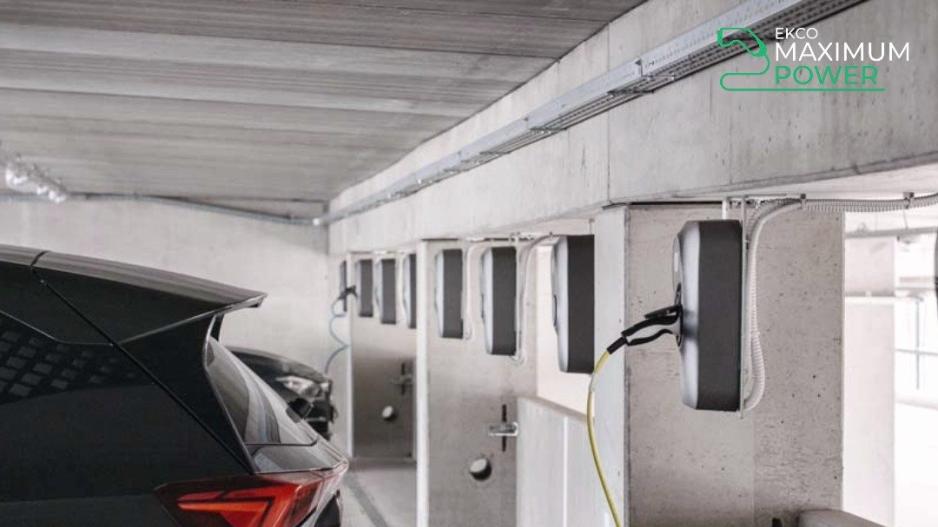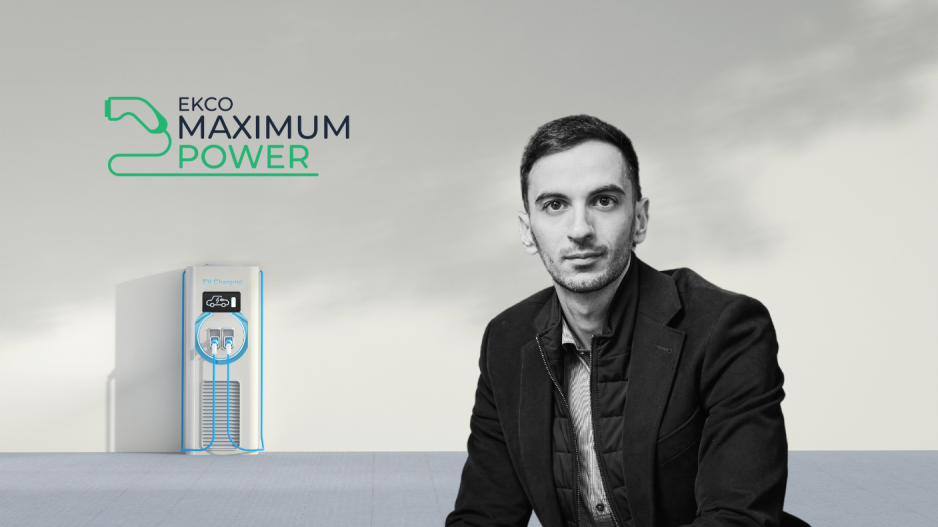Elias Kokkinos: “Being the First to Invest in This Market, We Had to Pay the Penalty”
EKCO Maximum Power Co-founder and Managing Director On Identifying Market Gaps, Pioneering EV Charging, Customer Focus, and Sustainable Growth
Electromobility is steadily gaining traction worldwide as we shift towards more sustainable and greener transportation solutions. This global trend is reflected in Cyprus, where a recent plan aims to ensure that by 2030, 25% of new vehicle registrations will be purely electric, with a goal to reach 100% by 2035. At the forefront of this transformative wave is EKCO Maximum Power, a trailblazer in electromobility and electric vehicle charging in Cyprus. The company, co-founded by Elias Kokkinos, who is also the managing director of the Smoothie Factory Cyprus, and Charalambos Onoufriou, specializes in installing EV charging stations and is dedicated to fostering the adoption of electric and hybrid vehicles. Elias Kokkinos was also recently elected Vice President of the newly established Association of Electromobility Companies and Professionals, which aims to promote electromobility and develop a network and infrastructure for recharging electric vehicles across the island.
In our interview with Elias Kokkinos, Managing Director of EKCO Maximum Power, we delve into the nuances of pioneering the EV charging industry. Elias shares insights on navigating market challenges, the importance of customer care, and the strategic shift from the health food sector to electromobility. He also discusses the broader implications of this transition for Cyprus, highlighting the company's commitment to innovation and sustainable growth.

In my role as Managing Director of the Smoothie Factory, I developed a keen understanding of consumer preferences and identified a gap in the market for healthier juice bar offerings and healthy eating options in Cyprus. This experience taught me the importance of staying attuned to market trends (global and local), consumer needs, and emerging opportunities.
Identifying market needs and go after it in a very determined and professional manner
When it comes to EKCO Maximum Power LTD, the transition from the smoothie business to the EV charging industry may seem unexpected, but it's rooted on a similar mindset and approach, that of in identifying market needs and go after it in a very determined and professional manner. As I observed the evolving landscape and global efforts towards sustainability practices, me and my business partner Charalambos Onoufriou, recognized a growing demand for electric vehicles mobility and the need for a robust charging infrastructure to support this transition to a more sustainable EV mobility ecosystem.
The decision to venture into the EV charging business was the result of careful market research and deep understanding of the global and local trends, analysis of EU and government initiatives and policies on promoting e-mobility, and an understanding of the increasing environmental consciousness among consumers. Additionally, we identified a gap in the local market for reliable, efficient, and widespread EV charging solutions.
The underlying strength and propulsive fuel of our business is that of customer care and service excellence
By leveraging our experience in identifying opportunities and understanding consumer behavior,we saw the potential to contribute to the sustainable future of transportation while meeting a pressing market need. This strategic business decision to go after the opportunities associated with EV charging infrastructure, reflects our adaptability and ability to seize opportunities, daring to be the first in addressing the market in such a holistic approach. The underlying strength and propulsive fuel of our business is that of customer care and service excellence. Technology alone is essential -and we proud ourselves that rely on best technology partners for this- but respect for your client is even more important!
Establishing EKCO Maximum Power LTD as a leader in the EV charging port industry came with its own set of challenges, as we consciously knew from the beginning that being the first to invest in this market, we had to ‘pay the penalty’ in creating and maturing this market. Such challenges include:
-
Charging Stations Network and Infrastructure Development: Creating a robust and widespread charging infrastructure requires significant investments in both technology and physical infrastructure. Helping our customers to secure suitable locations, obtaining necessary permits, and deploying reliable charging stations posed initial hurdles as there was no national policy on developing a country-wide infrastructure.
-
Regulatory Landscape: Navigating the complex regulatory environment associated with the EV charging industry is a challenge. Regulations related to energy distribution, environmental standards, and safety compliance vary, and staying ahead of these changes while ensuring full compliance can be demanding.
-
Technology Integration: Implementing cutting-edge charging technologies and ensuring compatibility with various electric vehicle models presented technical challenges. Integrating smart features, payment systems, and remote monitoring required a careful selection of technology partners and continuous updates to keep pace with advancements.
-
Consumer Awareness: In many regions and especially in our market - Cyprus, awareness about electric vehicles and the benefits of EV charging infrastructure may be limited. Educating the public about the advantages of electric mobility and the convenience of EV charging was and still is an ongoing effort to encourage adoption.
-
Partnerships and Collaborations: Establishing collaborations with vehicle importers, local governments, and other stakeholders is vital for the triumph of an EV charging network. Although negotiating agreements and aligning interests among diverse entities can be time-consuming and intricate, we are confident that, over the past years, we have reached a point where we canconfidently claim that we have accomplished this task.
-
Operational Reliability: Ensuring the dependability and continuous operation of charging stations is of utmost importance. Swiftly resolving technical issues, implementing proactive maintenance, and maintaining a responsive customer support system are crucial for fostering trust among users. Our focus has consistently been on assembling the right team to deliver top-notch customer service.
-
Economic Viability: Achieving a sustainable business model in the EV charging industry involves balancing the need for affordability for consumers with the financial viability of the charging network. Determining pricing strategies and exploring revenue streams beyond charging fees are key considerations.
-
Competitive Landscape: The EV charging market is very dynamic and competitive. Staying ahead, offering unique features, and continuously innovating to meet evolving customer expectations are ongoing challenges.
Despite these challenges, successfully navigating and addressing them contributes to the growth and leadership of EKCO Maximum Power LTD in the EV charging industry. Adaptability, strategic planning, and a commitment to sustainability have been crucial in overcoming these obstacles and establishing a strong position in the market.
Making Cyprus more accessible to EVs involves a multifaceted approach that addresses infrastructure, policy, awareness, and economic factors. Here are several key considerations:
Charging Infrastructure Expansion: Increase the number of charging stations: Invest in the expansion of the charging infrastructure, ensuring a widespread network of charging stations across the whole Cyprus in addition a deployment of fast-charging stations along highways and major routes to facilitate long-distance travel is crucial.
Incentives and Subsidies: Government incentives: Introduce financial incentives and instruments, tax credits, or subsidies to make EVs more affordable for consumers. This something that has already been initiated in 2023 through a government scheme support by the EU called “Ηλεκτροκίνηση με τα 1000” and it has also been announced that the same scheme will be available in 2024. This also includes incentives for businesses to install charging stations on their premises, encouraging private sector participation in the expansion of charging infrastructure. Another example can be an incentives program for transitioning all our aged taxi and rental fleets towards EV mobility.
We do not have to ‘reinvent the wheel’… there is a robust and very comprehensive EU framework for EV mobility
Regulatory Framework: Streamline permitting processes: Simplify and expedite the permitting processes for installing charging stations to encourage private and public investments and at the same time we need to standardize regulations and what I mean by that is to develop and implement standardized regulations for EV charging infrastructure to create a consistent and clear framework. We do not have to ‘reinvent the wheel’…. there is a robust and very comprehensive EU framework for EV mobility as well as numerous best practices and examples from other Member State countries. All required is the political will and determination to execute.
Public Awareness and Education: Educational campaigns: Launch public awareness campaigns to educate consumers about the benefits of EVs, dispel myths, and promote the environmental and economic advantages of electric mobility.
Fleet Electrification: Government needs to provide additional and stronger incentives for businesses and government departments and ministries - government must lead by example and show the way - to electrify their vehicle fleets, contributing to a higher demand for EVs. As of today, we see no or very little adoption of EV mobility by the government.
Integration with Renewable Energy: Renewable energy sources: Integrating renewable energy sources, such as solar and wind, into the power supply for charging stations to enhance the sustainability of EVs is for success. Relying only on conventional fossil fuel electrical energy for charging the EV is not the way forward. Energy storage solutions: Explore the use of energy storage solutions to manage peak demand and ensure a stable power supply for charging infrastructure. This is a huge topic at global level. Currently in Cyprus we solely rely on one energy company and for this reason the infrastructure enabling the use of storage, flexible tariffs and energy trading has not been developed. We must initiate action and gradually reorganise the energy industry enabling storage for both commercial and home use.
Financial Support for Charging Point Operators: Introduce initiatives offering financial assistance to charging station operators, incentivizing their investment in dependable and user-friendly charging solutions. Becoming a Charging Point Operator (CPO) involves substantial capital expenditure due to infrastructure costs, equipment expenses, and ongoing maintenance. The government should initiate a dedicated program for CPOs, providing support through subsidies for their investments and allocating prime locations for installing and operating charging stations.
By addressing these aspects comprehensively, in a disciplined and professional manner can put Cyprus into the European leading countries in EV addition.
Certainly, our company is at the forefront of technological advancements in the electric vehicle charging sector. Some of the cutting-edge technologies and innovations we are currently developing in collaboration with our international partners include:
We are rigorously testing -in collaboration with our manufacturing partners- new products under the working and environmental conditions of Cyprus, where high temperatures often lead to chargers going into derating mode. This ensures that our chargers can withstand and perform optimally in challenging climates.
Moreover, in a pioneering move, we are working on the integration of our EV chargers with Building Management Systems (BMS) that have not been integrated before. These integrations aim to enhance the overall efficiency and compatibility of EV charging systems and at the same system creating an eco-system that everything works seamlessly.
Anticipating the arrival of Vehicle-to-Grid (V2G) technology, we are proactively preparing for its integration into our systems
Anticipating the arrival of Vehicle-to-Grid (V2G) technology, we are also proactively preparing for its integration into our systems. V2G enables bi-directional energy flow between electric vehicles and the grid, allowing vehicles to not only charge but also discharge energy back to the grid. This forward-looking initiative positions us to embrace and leverage V2G capabilities when they become mainstream.







